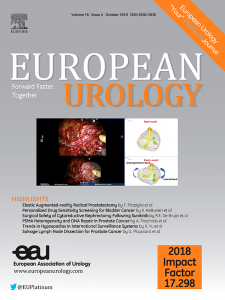名字里有什么?晚期前列腺癌患者的用词为何很重要
IF 25.2
1区 医学
Q1 UROLOGY & NEPHROLOGY
引用次数: 0
摘要
转移性荷尔蒙敏感性前列腺癌(mHSPC)关于 "阉割 "一词的科学准确性和对患者的负面含义的争论之前已经讨论过[3]、[4],这显然是上述正面和负面力量的一个突出例子。特别是,我们认为 "阉割 "一词让患者、伴侣和家人难以接受,因此在描述这种晚期前列腺癌疾病状态时应避免使用。 mHSPC 是新诊断出的抗雄激素前列腺癌(ARPC)患者的最常用术语,其中一个广泛使用的术语是 "阉割耐药 "前列腺癌。雄激素受体通路抑制剂(ARPI)雄激素受体(AR)通路抑制剂(如醋酸阿比特龙、阿帕鲁胺、达罗鲁胺、恩扎鲁胺)似乎有很多名字,最早的 "抗雄激素"(如比卡鲁胺)可追溯到几十年前。目前,AR 信号抑制剂(ARSI)、新型激素疗法(NHT)、AR 靶向药物(ARTA)、第二代或下一代激素疗法等各种术语都在使用。mHSPC的联合疗法(ADT加ARPI+/-多西他赛)多项随机试验表明,在ADT基础上加用ARPI("双联疗法")或在ADT和多西他赛化疗基础上加用ARPI("三联疗法")可提高mHSPC的总生存率[6], [7]。将由两种或三种药物组成的治疗方案描述为双联或三联疗法可能具有描述性,但很容易造成误解。例如,一些研究者用 mHSPC 中的 "三联疗法 "来描述 ADT + ARPI + 前列腺放疗。未来本文章由计算机程序翻译,如有差异,请以英文原文为准。
What’s in a Name? Why Words Matter in Advanced Prostate Cancer
求助全文
通过发布文献求助,成功后即可免费获取论文全文。
去求助
来源期刊

European urology
医学-泌尿学与肾脏学
CiteScore
43.00
自引率
2.60%
发文量
1753
审稿时长
23 days
期刊介绍:
European Urology is a peer-reviewed journal that publishes original articles and reviews on a broad spectrum of urological issues. Covering topics such as oncology, impotence, infertility, pediatrics, lithiasis and endourology, the journal also highlights recent advances in techniques, instrumentation, surgery, and pediatric urology. This comprehensive approach provides readers with an in-depth guide to international developments in urology.
 求助内容:
求助内容: 应助结果提醒方式:
应助结果提醒方式:


